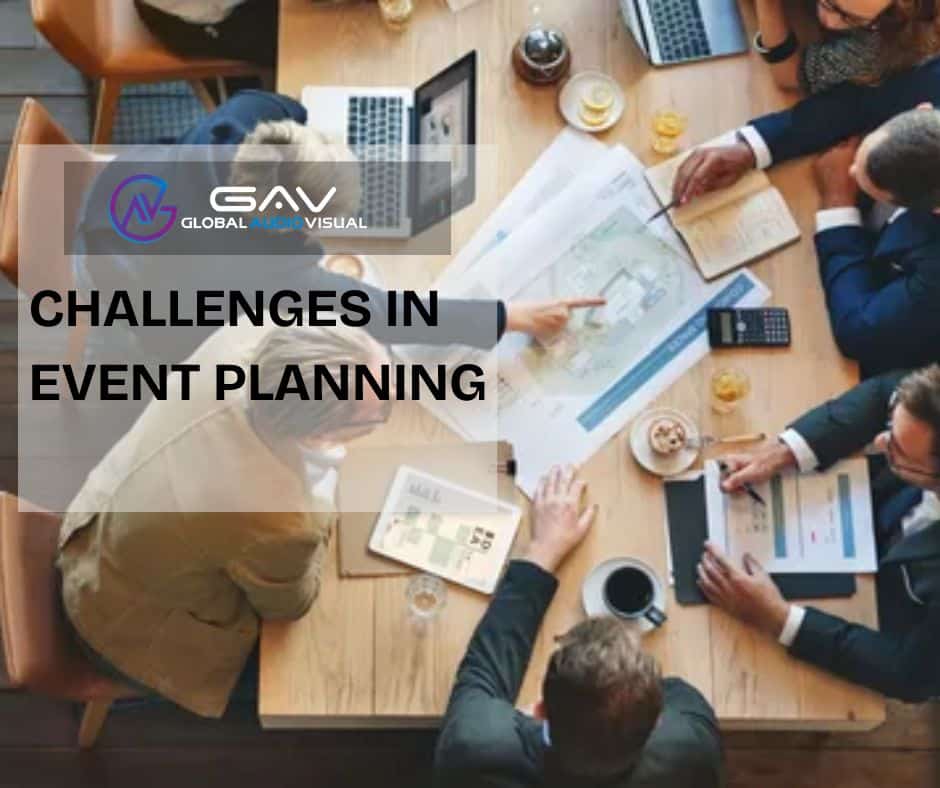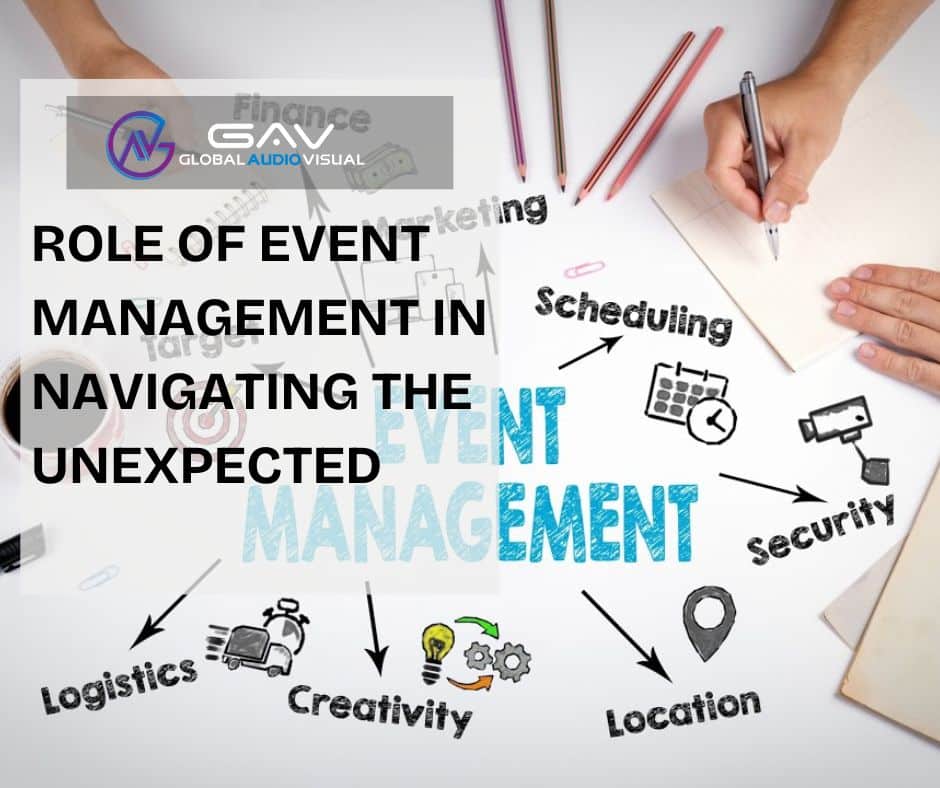Challenges in Event Planning are unavoidable, no matter how thorough the preparation is. Whether you’re organizing a corporate conference, product launch, or private celebration, unexpected events can disrupt even the most carefully crafted event schedule. That’s why event planners must anticipate potential issues and remain agile. The ability to adapt quickly and maintain composure separates a chaotic event from a successful one.
From managing event logistics to leading diverse team members, dealing with technical glitches, and ensuring an optimal attendee experience, event planning challenges test your foresight and flexibility. This guide walks you through the most common hurdles and how to handle them while highlighting how a trusted partner like Global Audio Visual can make all the difference.
Common Event Planning Problems and Solutions
Every event requires extensive planning, clear communication, and smart project management. Yet, even the best-laid plans can go awry. Below are common challenges event professionals face and actionable solutions to help you stay prepared.
1. Last-minute cancellations and No-Shows
Problem: Speakers, vendors, or entertainers cancel unexpectedly.
Solution: Always have a backup list of suppliers and entertainers. Build a solid network and maintain good relationships so you can call in reinforcements quickly when needed. Communication tools, such as event apps or direct messaging systems, can help coordinate updates with attendees and event staff in real-time.
2. Budget Overruns
Problem: Unanticipated costs disrupt your event budgets, threatening the overall experience.
Solution: Plan your event budgets meticulously, accounting for emergency funds. Unexpected needs like additional lighting, extended hours, or security should have a pre-set cushion in your financial plan.
3. Technical Issues
Problem: Poor sound quality, lighting failures, or visual presentation mishaps can derail engagement.
Solution: Collaborate with experienced AV professionals like Global Audio Visual, who provide not only state-of-the-art equipment but also on-site support. Handling unexpected challenges in AV requires preparation and redundancy—have backup equipment and test everything ahead of time.
4. Weather Disruptions
Problem: Outdoor events are at the mercy of nature.
Solution: Always have a contingency plan for bad weather, including indoor alternatives, tents, or rescheduling options. Use social media and SMS alerts to keep attendees updated.
5. Low Attendee Engagement
Problem: Disengaged attendees can make even a well-organized event feel flat.
Solution: Use interactive technologies like mobile apps, gamification, polls, or Q&A sessions to boost attendee engagement. Plan breaks and networking sessions, and use live updates on social media to keep the energy up.
The Role of Event Management in Navigating the Unexpected
Event management is more than organizing—it’s about staying calm under pressure. Let’s explore how proactive event planners and event professionals can manage unanticipated roadblocks:
Risk Mitigation Through Project Management
Project management principles help break down the event into manageable tasks, complete with timelines, assigned responsibilities, and measurable goals. This system is essential when facing disruptions.
- Create a detailed event schedule with critical deadlines.
- Establish escalation protocols for various emergencies.
- Set contingency milestones for high-risk components like travel arrangements or live streaming.
The Power of a Contingency Plan
Every event challenge demands foresight. A good contingency plan includes:
- Backup vendors and suppliers
- Alternate venue options
- Flexible AV solutions
- Real-time communication strategies
- Emergency roles for team members
A written, rehearsed plan ensures all event staff know exactly what to do when a curveball is thrown.
Communication is Key
One of the most overlooked event planning challenges is poor communication. Ensure smooth coordination with:
- Daily briefings for team members
- Clear chain of command for quick decisions
- Transparent updates to attendees and stakeholders
Event Logistics: The Backbone of a Successful Event
Event logistics refers to the behind-the-scenes coordination of transportation, setup, AV equipment, signage, seating, catering, and more. Poor logistics planning can lead to missed deliveries, confused guests, or service interruptions.
Tips for Smooth Event Logistics:
- Confirm vendor arrival times well in advance.
- Coordinate with venue managers on storage, electricity, Wi-Fi, and setup procedures.
- Use walkie-talkies or internal apps for seamless communication between event staff.
- Always perform a dry run with AV teams, lighting, and stage directions.
Event planners face enormous pressure to ensure nothing falls through the cracks—this is where choosing the right AV partner can be your safety net.
Why Choose Global Audio Visual for This Service?
When facing challenges in event planning, Global Audio Visual offers the expertise, technology, and dependability you need to overcome obstacles and produce a successful event.
1. Proven Event Professionals
Global Audio Visual has a dedicated team of event professionals who understand how to anticipate, plan for, and solve issues. Their experience allows them to adapt quickly to unexpected events without compromising quality or attendee experience.
2. Attention to Detail in Project Management
From the initial concept to the final wrap-up, Global Audio Visual manages every technical aspect with meticulous care. Their project-based approach ensures nothing is overlooked—whether it’s a small lighting adjustment or a last-minute video feed change.
3. Cutting-Edge Equipment and Support
They offer the latest in AV tech, including video walls, LED lighting, microphones, live streaming, and IT services. More importantly, they provide on-site professionals who monitor performance and handle any hiccups that may occur.
4. Customized Solutions for Every Event
Whether you’re hosting a hybrid event, a fully virtual seminar, or a massive corporate gala, Global Audio Visual adapts to your vision and needs. Their ability to customize solutions ensures that your event runs smoothly, even if things don’t go exactly as planned.
Event Planner Insights: Navigating the Unpredictable
Let’s take a moment to think like an event planner. Here are a few key philosophies that help ensure success:
- Always have backups. This applies to people, gear, and ideas.
- Plan as if something will go wrong. Murphy’s Law exists for a reason.
- Focus on the attendee. Every solution should enhance the attendee experience.
- Review after every event. Document what went wrong and what worked for future reference.
By following these guidelines, you’ll be better equipped to navigate event planning challenges head-on.
Enhancing the Attendee Experience with Smart Technology
Today’s events require interactive and immersive elements to keep attendees engaged and excited. But smart technology can also be a safeguard when things go wrong.
How Technology Helps:
- Use RFID badges or QR codes to track attendee data and movement for better crowd management.
- Mobile apps provide updates on sessions, changes, or alerts.
- Livestreaming tools allow for hybrid flexibility when schedules shift.
With these systems in place, you’re more equipped to face any event challenge that comes your way.
The Role of Social Media in Handling Unexpected Challenges
Social media can be a powerful ally in moments of crisis or change. Whether it’s posting real-time updates or addressing attendee concerns, platforms like X (formerly Twitter), Instagram, and LinkedIn help control the narrative.
Key Tactics:
- Create a social media plan with scheduled posts and emergency protocols.
- Use hashtags to keep updates organized and searchable.
- Assign a team member specifically to monitor and respond to social media activity during the event.
Planning Events for the Future
Every event is a learning opportunity. Keep track of what went well, what didn’t, and what could be improved for future events.
Build Institutional Knowledge:
- Record lessons learned from past event challenges.
- Build templates for timelines, vendor checklists, and event schedule structures.
- Maintain a repository of reliable contacts for various services.
By reflecting and evolving, you reduce the chance of repeat problems and improve your ability to plan.
Conclusion
Handling unexpected challenges is an essential skill for anyone involved in planning events. From last-minute speaker cancellations to power outages or disengaged guests, the ability to pivot gracefully determines the success of your event. And when it comes to challenges in event planning, having the right partner—like Global Audio Visual—ensures you’re never alone in solving problems.
With a deep understanding of event logistics, dependable event professionals, robust project management, and cutting-edge technology, Global Audio Visual equips you with everything needed to make your event run smoothly, no matter what surprises arise.
So, as you prepare for your next event, remember: It’s not just about planning for what will happen—it’s about preparing for what might. And with the right team by your side, every unexpected challenge becomes a stepping stone to a more polished, more professional, and more impactful experience.



